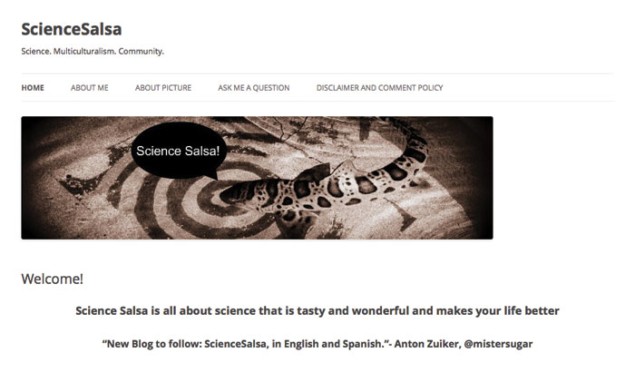
So what is the site about?
Like many of the websites that appear in this column, Science Salsa is a blog about science and science communication. The twist is that this site likes to serve up its science in Spanish as well as in English, and it is, accordingly, divided into sections for “red salsa” (English-language posts) and “salsa verde” (Spanish-language posts). There is also a small section for bilingual posts under the label “Christmas/Navidad salsa”.
Who is behind it?
Science Salsa is the work of Ivan Fernando Gonzalez, a biophysicist who was born in Colombia and now lives in the US. Since 2012 he has been pursuing a career in science communication: in addition to the Science Salsa blog, he also curates a bilingual pair of Facebook pages called “Science Salsa” and “Salsa de Ciencia” and maintains a page of resources for non-English science communication on his personal website, www.ivanfgonzalez.com.
What are some of the topics covered?
Several recent posts in the “red salsa” section of Science Salsa describe what (and who) gets left out when science is communicated only in English. While Gonzalez acknowledges that English is the current “lingua franca” of science (and that this has many benefits for international collaborations), he also points out that native English speakers make up only 6% of the world’s population, and proficiency among second-language speakers is patchy. For example, someone who can read scientific papers in English may not feel confident enough to give a talk in the language.
Who is it aimed at?
Some of what Gonzalez blogs about relates specifically to science communication in the US, a country with an English-speaking majority and a sizeable Spanish-speaking minority. However, the information and advice in many posts could apply equally well to other languages and contexts. People who teach physics or do science outreach in areas with a high percentage of non-native English speakers will find plenty to relate to in the post on “The seven things you should know about non-English science communication”. Current physics students with an interest in science communication or outreach careers will also appreciate Gonzalez’ posts about his “learning curve” in the field.
Can you give me a sample quote? I like red salsa.
From a July 2013 post about threats to Peru’s Jicamarca Radio Observatory (ROJ): “During the early days of space exploration, the US National Bureau of Standards required a facility to explore the ionosphere from the Earth’s surface. They needed a unique extended flat location near the magnetic equator, with moderate weather year-long, isolated from lateral radiation, and close enough to a major city to get the material and human resources needed for its construction and maintenance. They found the ideal place in the coastal mountains of the Peruvian desert…Unfortunately, [the ROJ’s] location near Lima is getting to be a problem [because a private trash management company has claims on it]…this observatory is an invaluable scientific resource that needs to be?protected.”
Yo prefiero la salsa verde. ¡Dame un ejemplo!
Bueno, si puede entenderlo, aquí hay una cita en español, de noviembre 2013: “En mis trece años en los Estados Unidos mi Inglés ha mejorado bastante, pero el idioma es una barrera que se carga perpetuamente en el ambiente profesional, como cuando se pierden segundos valiosos en una presentación o conversación, tratando de buscar la palabra correcta en el idioma que aprendiste como adulto. Aún más, durante la revisión de un artículo para publicación que hice en el pasado para una revista científica, recuerdo que uno de los factores más frustrantes de la revisión fue el Inglés tan pobre de los autores, que hacía casi imposible evaluar la validez de la ciencia que trataban de explicar.”



